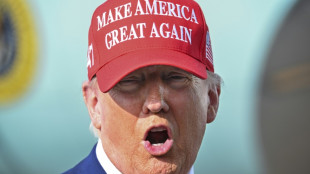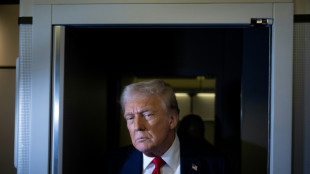
-
 Chinese developer under scrutiny over Bangkok tower quake collapse
Chinese developer under scrutiny over Bangkok tower quake collapse
-
Sirens wail and families cry at Myanmar disaster site

-
 Three things on Australia's former Russian tennis star Daria Kasatkina
Three things on Australia's former Russian tennis star Daria Kasatkina
-
Stock markets rise ahead of Trump tariffs deadline

-
 Facing US tariffs, Canadians hunt for business in Europe
Facing US tariffs, Canadians hunt for business in Europe
-
Trumpets, guns, horses: northern Nigeria's Durbar ends Ramadan in style

-
 Defiant French far right insists 'we will win' despite Le Pen ban
Defiant French far right insists 'we will win' despite Le Pen ban
-
Hezbollah official among four dead in Israeli strike on Beirut

-
 Liverpool's Slot unfazed by Alexander-Arnold Real Madrid links
Liverpool's Slot unfazed by Alexander-Arnold Real Madrid links
-
Hezbollah official targeted in deadly Israeli strike on Beirut

-
 Israel PM drops security chief nominee under fire from Trump ally
Israel PM drops security chief nominee under fire from Trump ally
-
Stock markets edge up but Trump tariff fears dampen mood

-
 South Korea court to rule Friday on president impeachment
South Korea court to rule Friday on president impeachment
-
'Can collapse anytime': Mandalay quake victims seek respite outdoors

-
 Stock markets edge back but Trump tariff fears dampen mood
Stock markets edge back but Trump tariff fears dampen mood
-
Myanmar holds minute of silence for more than 2,000 quake dead

-
 Kenya president still handing cash to churches despite his own ban
Kenya president still handing cash to churches despite his own ban
-
Israeli strike on Beirut kills three

-
 Russia-born Kasatkina says 'didn't have much choice' after Australia switch
Russia-born Kasatkina says 'didn't have much choice' after Australia switch
-
Carmakers face doubts and jolts over US tariffs

-
 China holds large-scale military drills around Taiwan
China holds large-scale military drills around Taiwan
-
'Heartbreaking' floods swamp Australia's cattle country

-
 South Korean baseball put on hold after fan killed at stadium
South Korean baseball put on hold after fan killed at stadium
-
Celtics, Thunder power toward NBA playoffs, Lakers shoot down Rockets

-
 French prosecutors demand Volkswagen face fresh Dieselgate trial
French prosecutors demand Volkswagen face fresh Dieselgate trial
-
Sam Mendes to launch four 'Beatles' movies in same month

-
 Battery boom drives Bangladesh lead poisoning epidemic
Battery boom drives Bangladesh lead poisoning epidemic
-
South Korea president impeachment ruling Friday: court

-
 Israel strikes Hezbollah operative in Beirut, kills 3
Israel strikes Hezbollah operative in Beirut, kills 3
-
Desperate Rohingya mark Eid in Indonesia limbo

-
 Sam Kerr has 'full support' of Australia squad, vice-captain says
Sam Kerr has 'full support' of Australia squad, vice-captain says
-
Asian markets edge back but Trump tariff fears dampen mood

-
 Teenage opener Konstas gets Australia contract with Ashes on horizon
Teenage opener Konstas gets Australia contract with Ashes on horizon
-
S. Korea court to rule Friday on President Yoon impeachment

-
 Myanmar to hold minute of silence for more than 2,000 quake dead
Myanmar to hold minute of silence for more than 2,000 quake dead
-
Far-right leaders rally around France's Le Pen after poll ban

-
 SpaceX launches private astronauts on first crewed polar orbit
SpaceX launches private astronauts on first crewed polar orbit
-
China launches military drills around Taiwan

-
 Political support leading to increasing fallout for crypto
Political support leading to increasing fallout for crypto
-
France's Le Pen seeks to keep presidency hopes alive after election ban

-
 Trump tariffs threaten Latin American steel industry
Trump tariffs threaten Latin American steel industry
-
'Tariff man': Trump's long history with trade wars

-
 Tariffs: Economic 'liberation' or straitjacket?
Tariffs: Economic 'liberation' or straitjacket?
-
Undocumented migrants turn to Whatsapp to stay ahead of US raids

-
 What next for Venezuela as Trump goes after oil revenues?
What next for Venezuela as Trump goes after oil revenues?
-
New Zealand Rugby and Ineos settle sponsorship dispute

-
 China says launches military exercises around Taiwan
China says launches military exercises around Taiwan
-
Team New Zealand fails in bid to host 2027 America's Cup

-
 Electrovaya Receives Purchase Orders for Batteries from Fortune 500 Customer to Re-Power Three Existing Distribution Centers
Electrovaya Receives Purchase Orders for Batteries from Fortune 500 Customer to Re-Power Three Existing Distribution Centers
-
American Critical Minerals Applauds US Presidential Executive Order to Increase / Expedite Domestic Critical Mineral Extraction & Processing - Specifically including Potash


DEA Forces Marijuana Pharma Drug Industry Offshore: A Symbol of DEA Systemic Obstruction Against Trump Administration Directives
"The DEA's marijuana approach is stuck in an outdated ‘war on drugs' mentality," said Duane Boise CEO of MMJ International Holdings. "While lawmakers push for medical progress, the DEA's red tape is suffocating innovation."
DEA officials, including Matt Strait and Thomas Prevoznik, have been accused of imposing unnecessary hurdles, such as slow-walking API Bulk Manufacturing registrations, and imposing opaque approval processes while patients continue to suffer.
As the Trump administration pushes to reshore pharmaceutical manufacturing through aggressive tariffs and trade policies, a less visible but equally critical challenge persists: the Drug Enforcement Administration's (DEA) stringent regulations. Critics argue that the agency's bureaucratic delays and restrictive oversight are not only hindering medical research but also driving pharmaceutical companies overseas, undermining domestic innovation and economic goals.

The MMJ Marijuana Case: A Symbol of DEA Systemic Obstruction
At the heart of this debate is a high-stakes legal battle between MMJ International Holdings and the DEA. The company, which specializes in cannabis-based treatments for conditions like multiple sclerosis and Huntington's disease, alleges that the DEA has unlawfully delayed approvals for cultivating proprietary marijuana strains needed for research and drug development. These delays, MMJ claims, have delayed FDA clinical trials for its flagship drug, MMJ-002, and reflect a broader bias against cannabis-derived medicines.
The lawsuit also challenges the constitutionality of protections for Administrative Law Judges (ALJs), who oversee DEA cases. MMJ argues that these protections insulate ALJs from accountability, allowing inefficiency and bias to fester. The Department of Justice (DOJ) recently backed this view, declaring ALJ removal safeguards unconstitutional - a move that will force the DEA to operate with greater transparency and responsiveness.
Regulatory Delays vs. Legislative Progress
The DEA's actions stand in stark contrast to recent legislative efforts aimed at advancing medical research. Laws like the Right to Try Act and the Medical Marijuana Research Expansion Act were designed to streamline access to experimental treatments and expand cannabis studies. However, DEA officials, including Matt Strait and Thomas Prevoznik, have been accused of imposing unnecessary hurdles, such as slow-walking cultivation licenses and imposing opaque approval processes.
"The DEA's approach is stuck in an outdated 'war on drugs' mentality," said Duane Boise CEO of MMJ International Holdings. "While lawmakers push for medical progress, the agency's red tape is suffocating innovation."
The DEA's sluggish processes are exacerbating a growing trend: pharmaceutical companies relocating operations to countries with friendlier regulatory climates. Canada, Germany, and Israel-nations with clearer pathways for cannabis research-have emerged as hubs for drug development, luring American firms deterred by U.S. bureaucracy.
"Every month of delay costs millions and risks losing talent overseas," noted a CEO of a biotech startup. "The DEA's inefficiency is a competitive disadvantage for the U.S."
Broader Implications for DEA Accountability
MMJ's case could set a precedent for reforming how federal agencies operate. If the court sides with MMJ, agencies like the DEA will face increased executive oversight, potentially dismantling systemic inefficiencies. This shift could revitalize sectors reliant on timely approvals, including pharmaceutical manufacturing, and biotechnology.
The Cannabis Conundrum
Critics argue that the DEA's resistance to cannabis research is particularly shortsighted. With 38 states legalizing medical marijuana and global markets for cannabis-based therapies projected to reach $55 billion by 2027, the U.S. risks ceding leadership in a burgeoning industry. "The DEA is clinging to stigma over science," said Duane Boise an advocate for Pharmaceutical marijuana. "Patients are paying the price."
A Crossroads for U.S. Pharma and Marijuana Drug Development
The outcome of MMJ's lawsuit could determine whether the U.S. retains its edge in pharmaceutical innovation. A win for MMJ International Holdings will catalyze regulatory reforms, aligning the DEA with legislative and public sentiment. Conversely, a loss could accelerate the offshoring of research and production, leaving American patients dependent on foreign-developed treatments.
As the Trump administration champions "America First" trade policies, the DEA's role as an inadvertent roadblock highlights a stark contradiction. Without regulatory modernization, tariffs alone may fail to reverse the pharmaceutical exodus-or unlock the potential of groundbreaking therapies.
The Bottom Line:
The DEA's regulatory inertia is more than a bureaucratic hiccup; it's a critical threat to U.S. medical innovation and economic competitiveness. As legal and political battles unfold, the agency's ability to adapt may well decide the future of American pharmaceutical leadership.
For updates on this evolving story and its impact on cannabis research and federal accountability, follow our ongoing coverage.
MMJ is represented by attorney Megan Sheehan.
CONTACT:
Madison Hisey
[email protected]
203-231-8583
View the original press release on ACCESS Newswire
T.Ward--AMWN